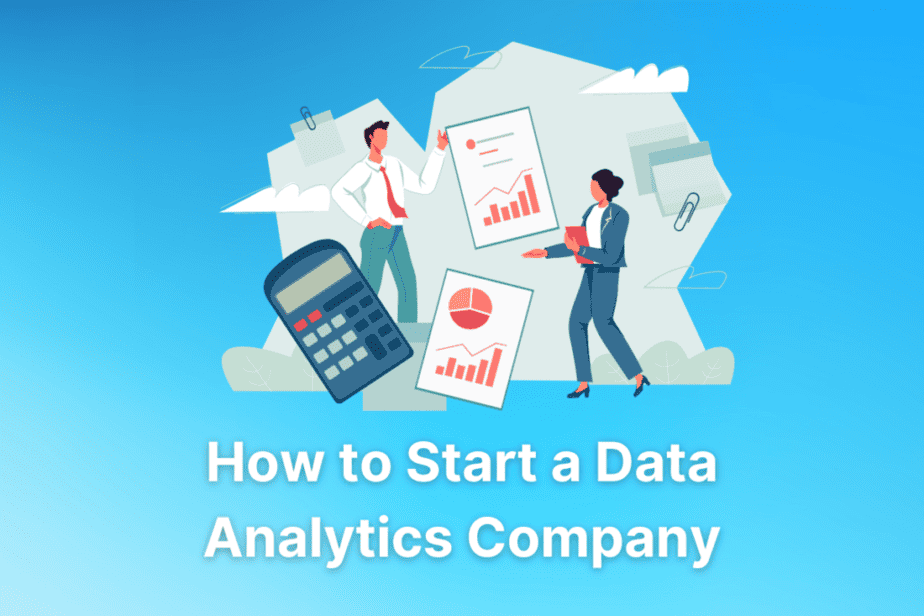How to Start a Data Analytics Company
We’re reader-supported; we may earn a commission from links in this article.
Data analytics has revolutionized the old process of decision-making in the industry. People become more aware that they can’t make conclusions without being data-driven in their approach.
Data analytics extract valuable insights from large datasets, help understand trends and predict outcomes. Most importantly, it prevents any poorly-made decisions in business.
If you’re considering diving into data analytics entrepreneurship, this article will guide you to establish your very own data analytics company.
Keep reading!

What Does a Data Analytics Company Do?
A data analytics company typically offers the proper tools and systems to collect, manage, and analyze large amounts of data. These valuable insights then help clients make better judgments.
The possibilities are vast when you’re wondering about potential clients for your data analytics business.
Implementing data-driven decisions is becoming more common and advanced since many companies want to stay ahead of their competition.
Around 60% of organizations across different industries, such as healthcare, education, retail, finance, and more, have integrated data analytics into their decision-making process.
As data analytics continues to play a crucial role in many industries, it’s no wonder we’re witnessing a surge in the number of data analytics companies. Then, how can you start one and strive to lead the game?
How to Start a Data Analytics Company
You need a smart strategy and a clear understanding of how this industry works to establish a thriving data analytics company. Let’s break down the key steps you’ll need to take:
1. Define a Starting Point
Before anything else, it’s crucial to set a clear starting point. With numerous opportunities at your fingertips, it’s tempting to consider all options at once.
However, the initial step is to choose your specialized niche. Which industries are you targeting? To illustrate, do you want to offer fraud detection solutions to FinTech companies or provide customer behavior analytics for the retail industry?
Once you determine your niche, focus on the value you can bring. Ask simple questions to guide your next steps: does your company provide data analytics services or products?
For example, if you’re creating analytics software for healthcare companies to track electronic health records, you might need a development team in your company. Build a product prototype and gather feedback from potential users.
Alternatively, onboarding an analytics expert becomes essential if you opt for a service-based enterprise. You need to develop a strong portfolio and pitch it to potential clients.
Regardless of the path you take, highlight your unique selling points to make your company stand out in the data analytics business.
2. Don’t Go All Gut Instincts
While intuition plays a role in decision-making, it’s best coupled with comprehensive knowledge. Allocate your time researching the data analytics industry, current trends, and potential competitors.
Take a better look at the pain points and needs of clients in your niche. This information will let you deliver solutions that address real challenges.
Let’s say you’re interested in healthcare analytics. Your intuition might lead you to focus solely on patient data, but further research uncovers that healthcare organizations are also struggling with effective workflow.
By recognizing this pain point, you could tailor your services to offer data insights and workflow solutions, allowing your company to solve extensive problems.
Balancing instincts with well-researched insights can elevate your company’s performance and help you become one of the industry-leading experts in data analytics.
3. Spark Innovative Concepts
Innovation holds a crucial key for businesses of all fields to achieve success. Embrace creative thinking that reshapes the process of data collection, analysis, and visualization.
Modern technology is growing rapidly nowadays, including artificial intelligence and machine learning. Step beyond the ordinary and try to experiment by incorporating your company with these cutting-edge technologies.
Suppose you have a client from a retail company aiming to enhance customer experience.
Traditionally, you could use descriptive analytics, collecting insights from their sales data history, followed by predictive analytics to foresee buying trends.
However, imagine a more creative approach by integrating the current technology into your data analytics process. For instance, you could employ sentiment analysis on social media posts to understand consumer preferences.
An innovative twist enables you to give clients more tailored insights and solutions. It will make your company unique and attract more customers in search of fresh ideas.
4. Focus on Developing Your Ideas
Once you have creative concepts, it’s time to nurture them. Devote your time to crafting detailed plans for your data analysis processes, tools, and methods.
If your company plans to offer services, outline your framework and workflow to ensure consistency and quality of your delivery to clients.
Then again, if you lean more toward creating a data analytics platform or software, consider learning the software development life cycle (SDLC) before delving into the development phase.
In addition, understanding different types of programming languages and databases will help you a lot. Which one do you excel at? Is it Python and SQL or Java, Scala, or R?
For large-scale data processing, you have to think about the general engine you’ll use. Spark, Hadoop, or Hive can be an option. Each has its own strength and weakness.
5. Showcase Your Company and Win Clients
Now that you’re set and ready to go, it’s time to find some clients and earn money!
In a world where everything is transforming to digital, it’s vital to establish a solid online presence for your business.
You can start small by crafting a professional website highlighting your services and products. Featuring an explainer video about your company profile on your website also helps deliver your message to potential clients, emphasizing how your business can solve their problems.
Another way to exhibit an online presence is by creating a social media account for your company. It can be on Facebook, Instagram, or even Youtube.
Remember that you don’t have to be on every social media. Carefully choose one that works best for your business goal. Don’t forget to include clear contact information, such as email or phone number. Let people know how they can contact you for any inquiry.
While you can have many different online platforms for your data analytics company, keeping a consistent brand voice is essential by prioritizing transparency and credibility. After all, fostering trust is vital in attracting clients.
6. Provide Solutions, Not Just a Bunch of Numbers
Data analytics goes beyond numbers. Your clients probably don’t care about the data if it can’t fix their problems— either to increase sales, improve efficiency, or other goals.
Data analytics is about providing insights that drive action. Understand your client’s goals and adapt your analysis to fit their needs. Offer practical solutions that can solve their issues.
For example, your client is a retail company wanting to optimize its inventory management. Instead of confusing them with lots of data and numbers, you analyze how sales change over time and during different seasons.
Translate your analysis into simple and comprehensive data visuals. With these sales data insights, you can suggest the retail company implement a dynamic inventory strategy that adjusts its stock levels based on demand fluctuations.
By focusing on delivering solutions, clients will be happy with your work and more likely to return for future data analytics needs.
7. Scale Up But Don’t Spend Too Much
Start planning to scale your business as it grows and gains momentum. In that case, look for cost-effective ways to expand without compromising product or service quality.
Many options exist, such as migrating your data storage and processing to cloud computing platforms. This move cuts the cost for hardware upgrades and grants flexibility where you can adjust any data resources seamlessly.
In addition, you can employ some automation tools to handle immense duties. Routine tasks, like data cleaning or report generation, can also be automated. This helps in increasing your efficiency and ensures output consistency.
While you can integrate as many technologies as you want, maintaining a high standard of your company performance should remain a priority. If you balance everything well, this strategy will result in sustained quality and client satisfaction.
8. Measure Your Business with the Right KPIs
Last but not least, set some indicators to measure the success of your business. Key performance indicators (KPIs) are a compass for your company as it moves forward.
These indicators may help measure your data analytics company, such as project succession rate, client acquisition rate, revenue growth, data quality index, employee target, or ROI (Return on Investment).
To define the right KPIs, you need to reflect on the past performance of your business. You can also look up references online and adapt some of them to your company.
Wrapping Up
Starting a data analytics company requires a combination of technical expertise, innovation, and business savviness. Building a business from the ground up takes a lot of hard work and patience.
Begin by defining what sets you apart, then develop your idea until it’s ready to win some clients. While starting is easy, nurturing your business to survive the competition would be challenging.

Justin Chia
Justin is the author of Justjooz and is a data analyst and AI expert. He is also a Nanyang Technological University (NTU) alumni, majoring in Biological Sciences.
He regularly posts AI and analytics content on LinkedIn, and writes a weekly newsletter, The Juicer, on AI, analytics, tech, and personal development.
To unwind, Justin enjoys gaming and reading.


